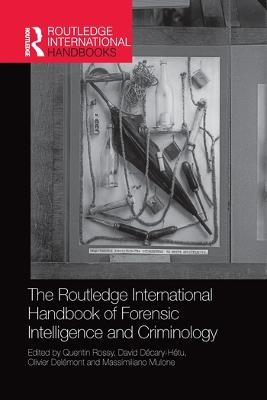
The Routledge International Handbook of Forensic Intelligence and Criminology
Routledge (Verlag)
978-0-367-58100-8 (ISBN)
Despite a shared focus on crime and its ‘extended family’, forensic scientists and criminologists tend to work in isolation rather than sharing the data, methods and knowledge that will broaden the understanding of the criminal phenomenon and its related subjects.
Bringing together perspectives from international experts, this book explores the intersection between criminology and forensic science and considers how knowledge from both fields can contribute to a better understanding of crime and offer new directions in theory and methodology.
This handbook is divided into three parts:
Part I explores the epistemological and historical components of criminology and forensic science, focusing on their scientific and social origins.
Part II considers how collaboration between these disciplines can bring about a better understanding of the organizations and institutions that react to crime, including the court, intelligence, prevention, crime scene investigation and policing.
Part III discusses the phenomena and actors that produce crime, including a reflection on the methodological issues, challenges and rewards regarding the sharing of these two disciplines.
The objective of this handbook is to stimulate a ‘new’ interdisciplinary take on the study of crime, to show how both forensic and criminological theories and knowledge can be combined to analyse crime problems and to open new methodological perspectives. It will be essential reading for students and researchers engaged with forensic science, criminology, criminal behaviour, criminal investigation, crime analysis and criminal justice.
Quentin Rossy is Assistant Professor at the École des Sciences Criminelles, Université de Lausanne, Switzerland. David Décary-Hétu is Assistant Professor at the École de Criminologie, Université de Montréal, Canada. Olivier Delémont is Full Professor at the École des Sciences Criminelles, Université de Lausanne, Switzerland. Massimiliano Mulone is Associate Professor at the École de Criminologie, Université de Montréal, Canada.
Introduction, Massimiliano Mulone, Quentin Rossy, David Décary-Hétu and Olivier Delémont, Part I Criminology and Forensic Science: Historical Developments and Epistemological Perspectives. 1. Twin Sciences? The History of Forensic Science and Criminology, Paul Knepper, 2. Criminology and Forensic Science as a Unitas Multiplex: An Epistemological Approach, Cândido da Agra, 3. Traceology, the Bedrock of Forensic Science and Its Associated Semantics, Pierre Margot, 4. A Method that Combines Criminology and Forensic Science: Considering the Case of Antiterrorism, Maurice Cusson, 5. A Rendezvous between Forensic Science and Criminology: Toward a Public Forensic Criminology? Roberta Julian and Manon Jendly, Part II Forensic Practices and Crime Regulation. 6. Forensic-Led Regulation Strategies: Are They Fit for Security Problem-Solving Purposes? Frank Crispino and Claude Roux, 7. Forensic Practices and Policies, Jan De Kinder, 8. The Practice of Crime Scene Examination in an Intelligence-Based Perspective, Olivier Delémont, Sonja Bitzer, Manon Jendly and Olivier Ribaux, 9. Boosting Crime Scene Investigations Capabilities through Crime Script Analysis, Benoit Leclerc, 10. The CSI Effect, Simon A. Cole and Glenn Porter, 11. Forensic Science and Wrongful Convictions, Joëlle Vuille and Christophe Champod, 12. Forensic Intelligence, Olivier Ribaux and Stefano Caneppele, 13. Prevention and Forensic Science: How Forensic Evidence Supports Prevention, Nick Tilley and James French, 14. Evaluating the Consumption of Illicit Drugs via Wastewater Analysis: How Forensic Indicators Are Used in Open and Confined Settings, Pierre Esseiva, Lisa Benaglia, Frederic Been and Frank Zobel, Part III Forensic Science and Crime Analysis. 15. Reconstruction and Study of Offending Trajectories through Forensic Evidence: An Illustration Using a Forensic DNA Database, Patrick P.J.M.H. Jeuniaux, Sabine De Moor, Luc Robert, Bertrand Renard, Caroline Stappers and Vanessa Vanvooren, 16. The Contribution of Forensic Science to the Analysis of Crime Networks, Quentin Rossy and Carlo Morselli, 17. The Forensic Science of Place, Rémi Boivin, 18. Exploratory Spatial Data Analysis Methodologies (ESDA): How They Can Be Used to Analyse Forensic Case Data, Simon Baechler and Stefano Caneppele, 19. Data Mining in Criminology and Forensic Science, Jean-Pierre Guay and Francis Fortin, 20. Online Crime Monitoring, David Décary-Hétu, 21. Internet Traces and the Analysis of Online Illicit Markets, Quentin Rossy and David Décary-Hétu, A Bright Road Ahead for Forensic Science and Criminology, David Décary-Hétu, Quentin Rossy, Olivier Delémont and Massimiliano Mulone
| Erscheinungsdatum | 01.07.2020 |
|---|---|
| Reihe/Serie | Routledge International Handbooks |
| Verlagsort | London |
| Sprache | englisch |
| Maße | 174 x 246 mm |
| Gewicht | 453 g |
| Themenwelt | Recht / Steuern ► Strafrecht ► Kriminologie |
| ISBN-10 | 0-367-58100-0 / 0367581000 |
| ISBN-13 | 978-0-367-58100-8 / 9780367581008 |
| Zustand | Neuware |
| Haben Sie eine Frage zum Produkt? |
aus dem Bereich


